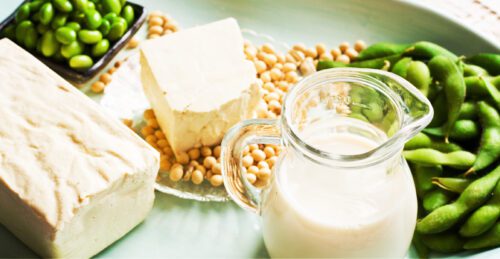The Soy Controversy
What a Topic, it got me thinking as I read 5 Surprising Effects of Eating Soy, Say Dietitians
Soy is a plant protein that can be prepared in a variety of ways, is a member of the pea family and associated with numerous health benefits.
As with all foods, quality matters.
Unfortunately, is controversial because of poor quality studies that were done years ago, as well as the wide use of genetically modified soy in our foods. Recent studies however, indicate that high quality, non-GMO soy has numerous health benefits. It’s best to look for 100% organic and non-GMO.
Another reason that the debate exists is the misunderstanding of how soy impacts human estrogen.
Soy contains a high concentration of plant estrogen, called phytoestrogens.
First, they are similar in function to human estrogen but, cause a much weaker effect or even an anti-estrogen result. Second, the body contains estrogen receptors where human estrogen must bind to be able to have an effect. So eating soy and getting the plant based estrogen (phytoestrogen) can occupy these sites, therefore causing human estrogen not to be able to bind and as a result cannot exert an effect. Some believe that eating soy raises estrogen when in fact the opposite is actually true.
Soybeans and soy foods have many health benefits
This could reduce risk of cardiovascular disease, coronary heart disease, stroke, prostate and breast cancer, as well as, improve bone health. Research done in 2015 and published in the British Journal on Nutrition found that consuming soy significantly reduced levels of total cholesterol, triglycerides and LDL cholesterol, while increasing HDL cholesterol.
- A study done in 2019 and published in the journal Molecules found soy prevented the accumulation of fat in rodents, and may play a role in managing obesity. Other studies show promising results for certain cancers, diabetes and osteoporosis.
Soybeans are high in protein
As well as being a complete protein, meaning that it contains all nine essential amino acids that must be obtained from the diet. They are also a good source of fat and carbs and rich in B vitamins, fiber, potassium, magnesium and isoflavones.
Sources of Soy:
- Soy milk, 1 cup 7 gm protein
- Tofu, 3 oz 8 gm
- Soybeans, 1/2 c 15 gm
- Edamame, 1/2 c 16 gm
Always process what you have learned about Soy
Consider that when reading articles about soy, we must take some information with a grain of salt. Often outdated, poor quality studies are the source. Current evidence and historical soy consumption in different areas of the world show that not only is soy safe, but also beneficial.
Eat all foods in moderation and seek out high quality, non-GMO foods.
My Blog
Recipes, Tips, & More
Silverbeet Fatteh with Sumac Yoghurt and Chickpeas
Silverbeet fatteh with sumac yoghurt and chickpeas. INGREDIENTS 2 cups (400g) dried chickpeas, soaked overnight 3 large pieces Lebanese bread, cut into 4 large triangles 1/4 cup (60ml) extra virgin olive oil, plus extra to drizzle 1/2 bunch silverbeet, stalks removed...


